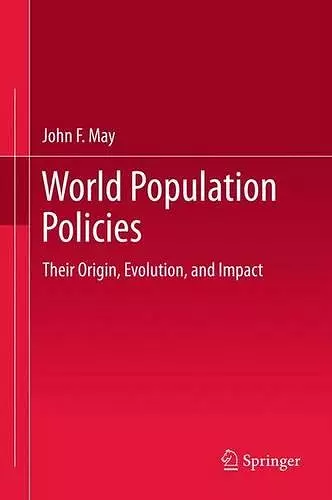World Population Policies
Their Origin, Evolution, and Impact
Format:Paperback
Publisher:Springer
Published:13th Apr '14
Currently unavailable, and unfortunately no date known when it will be back

"After more than a decade of neglect, population trends and their adverse social, economic, health, environmental, and political effects have returned to the global policy agenda. Government interventions aimed at minimizing unfavorable demographic developments have often been contentious. This timely and comprehensive book provides a wealth of valuable insight and thoughtful commentary on controversies and policy options." (Dr. John Bongaarts, PhD; Vice President and Distinguished Scholar, The Population Council, New York, NY) "Demography, like economics, is a discipline of cold precision. John May uses demography, without a whiff of exaggeration, to demonstrate how population growth, especially in Africa, is undermining economic progress and threatening good governance. It is imperative policy makers read World Population Policies: Their Origin, Evolution, and Impact." (Dr. Malcolm Potts, MB, BChir, PhD, FRCOG; Bixby Professor Population and Family Planning, University of California, Berkeley, CA) "Wide ranging and thorough, yet remarkably accessible for the non-expert, May's book is a stellar account of the state of our human population today. He brings the wisdom of broad experience to consider the variety of national and individual situations, and the urgent need for good equitable policy decisions. Numerous focus passages bring colour and compassion to the narrative." (John Sulston, PhD, FRS; shared the 2002 Nobel Prize in Physiology or Medicine; Chair, The Royal Society's Working Group on People and the Planet, London, UK)
This book examines the history behind the formulation, implementation, and evaluation of population policies in the more developed, the less developed, and the least developed countries from 1950 until today, as well as their future prospects.
This book examines the history behind the formulation, implementation, and evaluation of population policies in the more developed, the less developed, and the least developed countries from 1950 until today, as well as their future prospects. It links population policies with the theories of the demographic, epidemiological, and migratory transitions. It begins by summarizing the demographic situation around the world, with an emphasis on population policies and their underlying theories. Then, it reviews the early efforts to reduce mortality and fertility in the developing countries. This is followed by a description of the internationalization of the debate on population issues and the transformation of these programs into more formal population policies, particularly in the developing countries. The book reviews also the situation of the developed countries and their specific challenges – sub-replacement fertility, population aging, and immigration – and examines the effectiveness of population policies. It also explores the way forward and future prospects for population policies over the next decades. The book provides numerous concrete examples from all over the world, and show how population policies are actually implemented and what have been their successes as well as their constraints. Above all, the book highlights the importance of understanding underlying demographic trends when assessing the development prospects of any country.
The book is recommended for not only demographers, social scientists, and policymakers but also economists and political scientists who are interested in social and demographic change around the world. Demography students and researchers who are interested in applying knowledge on population trends and prospects in designing and evaluating public policies will find this an invaluable reference work.
From the reviews:
“The book is a welcome addition to the literature on population policy. … the author has written an informative survey of a complex, multidimensional topic. … It is especially useful for those who want a concise overview of diverse population policies in many parts of the world including their origin, evolution, and, to a lesser extent, their impact. … The author has presented an interesting, helpful, and unified book. It can be read with profit by the layperson, the student, the specialist, and the policymaker.” (Andrzej Kulczycki, Population Studies, Vol. 67 (2), 2013)
“The book should not, and will not, pass unnoticed, and not just among specialists in the field of population studies proper, but well beyond … those engaged in geopolitics and international relations. … John May presents a thorough overview of population policies in developing countries. … This is a highly readable book. It presents scholarship at its best. The narratives are enhanced by judiciously selected statistical tables. A motto is placed in the heading of each chapter to set the tone for the substantive discussion.” (Anatole Romaniuk, Canadian Studies in Population, Vol. 39 (1-2), Spring/Summer, 2ISBN: 9789401783125
Dimensions: unknown
Weight: 563g
340 pages
2012 ed.